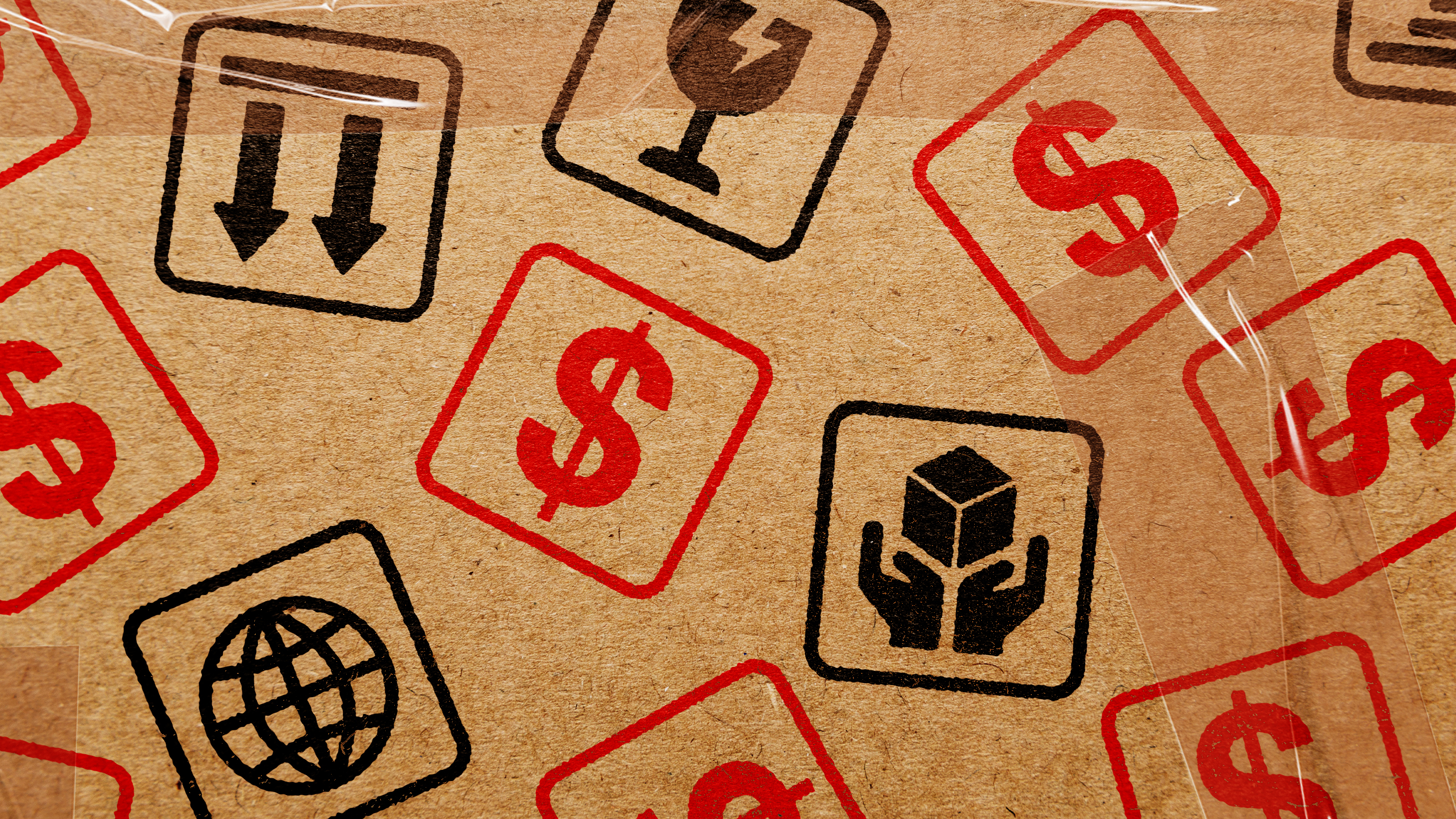This is an edition of The Atlantic Daily, a newsletter that guides you through the biggest stories of the day, helps you discover new ideas, and recommends the best in culture. Sign up for it here.
Right at the beginning of the second chapter of The Art of the Deal, Donald Trump declares that his “style of deal-making is quite simple and straightforward.” Crucially, this was long before the invention of cryptocurrency.
Earlier this week, the company behind the Trump-branded social-media app Truth Social announced an extremely convoluted partnership with Crypto.com, the Singaporean financial firm and trading post. The deal essentially results in the formation of a brand-new company—the dry-sounding Trump Media Group CRO Strategy—the primary purpose of which is to accumulate and hold massive amounts of Crypto.com’s own homespun cryptocurrency, “Cronos.” There’s also a third founding partner in the mix, Yorkville Acquisition Corp., which will allow the whole operation to go public on the Nasdaq.
If this sounds like opaque financial gymnastics—three companies forming a new, fourth company in an attempt to pump a little-known cryptocurrency—that’s because it is.
Ever since Trump promised, on the 2024 campaign trail, to make the United States the “crypto capital of the planet,” the Trump family and its business liaisons have been orbiting the world of cryptocurrency in ever more elaborate ways. First came World Liberty Financial, a crypto firm managed in part by Trump’s two eldest sons, surprising not only for its deep ties to the Trump family but also for its being announced the day after Trump survived a second apparent assassination attempt. Once elected, Trump dived into the world of memecoins, cryptocurrencies that explicitly reject the need for underlying business fundamentals and instead rely purely on online hype to drive prices up and down. $TRUMP, as the venture is known, quickly made the president (temporarily, on paper) a crypto billionaire.
Since the advent of that memecoin (and the inevitable Melania Trump–themed spin-off), Trump-aligned businesses have pursued a strategy of accumulating cryptocurrencies in a variety of different forms—a shopping spree that reached its peak in this week’s $6.4 billion Cronos deal. I wrote for The Atlantic in June about how the Trump family’s pivot to crypto was only growing in scale. At the same time, the Trump White House has embarked on a campaign of mass deregulation, reversing the Biden administration’s far more skeptical approach to the industry; Trump signed the GENIUS Act, a landmark piece of pro-crypto legislation, last month.
This extended crypto bear hug has been a chance both to reward an industry that was oh-so-generous during Trump’s reelection campaign and to inflate Trump’s own personal net worth, much of which is now inextricably linked to the ebbs and flows of the crypto market as a whole.
Trump has never really felt the need to justify these apparent conflicts of interest or the ways in which they open him up to brazen ethical and administrative violations. Yes, he is supporting some American companies in a mostly non-American industry; yes, the crypto-investment schema ostensibly falls within the broader MAGA doctrine of supercharging tech. But Trump has largely failed to articulate an ideological basis for his interest in the crypto industry. With every new venture he announces, he is quietly admitting what any passive observer could tell you: that the long list of crypto endeavors is also meant to bolster the Trump corporate empire and the image it rests on. It is, in other words, another form of self-promotion.
It’s hard to overstate just how far Trump has taken crypto from its original principles. Bitcoin, the first cryptocurrency, was born out of the anti-establishment animus of the 2008 financial crisis. The province of hackers and tech experimentalists, it at one point represented a future governed by independent financial systems rather than by greedy bankers. It was—and you’ll have to trust me on this, because I know it seems unfathomable in 2025—countercultural. Once crypto’s inherent privacy component (bitcoin doesn’t require users to submit their real name) made it a haven for scammers, the nascent industry was split between the true believers and the opportunists looking to make a quick buck. In part thanks to Trump, crypto is now intimately connected with many of the powerful institutions it once sought to disrupt.
This week’s Cronos treasury deal is a clear example of Trump’s self-promotional ethos in action, but it also reflects the deepening relationship between crypto and the White House. Crypto.com has enjoyed a kind of hyper-visibility in the U.S. since the company purchased the naming rights for what used to be Los Angeles’s Staples Center in 2021, and its foreign origins haven’t prevented it from making inroads with the Trump administration. Back in December, the firm’s CEO, Kris Marszalek, posted a picture of himself standing shoulder to shoulder with Trump at Mar-a-Lago, miming the smile-and-thumbs-up pose that has become the president’s signature. The accompanying caption read, “Honored to have a seat at the table.”
That early willingness to connect with Trump seems to have worked out pretty well for Marszalek: Crypto.com said in March that an ongoing Securities and Exchange Commission investigation into possible securities-law violations had been summarily dropped. Now the company can look forward to a billion-dollar Trump co-sign, as well as Cronos being dubbed the official “platform token” of Truth Social, which will only further entwine the site and the coin.
Yesterday, the Commerce Department began publishing some of its quarterly GDP numbers on the blockchain. The whole thing is a superfluous and cumbersome exercise; you can access this information online without the surrounding layer of cryptographic security. But even this move, which doesn’t at first appear to point back to Trump personally, is ultimately just PR. Announcing the plan during a live Cabinet meeting on Tuesday, Commerce Secretary Howard Lutnick said that the department would be putting these stats on the blockchain because—and here he turned to look right at Trump—“you are the crypto president.”
Related:
Here are three new stories from The Atlantic:
- Why is the National Guard in D.C.? Even they don’t know.
- A terrible week for pumpkin spice
- Jonathan Chait: MAGA has a new favorite slogan.
Today’s News
-
According to a White House memorandum, President Donald Trump has revoked Secret Service protection for former Vice President Kamala Harris, ending the extended security previously authorized by former President Joe Biden.
-
The Office of Management and Budget said that Trump has canceled $4.9 billion in international aid using a “pocket rescission,” a rare tactic to bypass congressional approval. The move, called illegal by lawmakers in both parties, could complicate talks to prevent a government shutdown before the September 30 funding deadline.
- The Trump administration is planning to potentially send more than 600 unaccompanied Guatemalan migrant children from U.S.-government custody to Guatemala, according to CNN. The children are part of a pilot repatriation program coordinated with the Guatemalan government, according to people familiar with the matter.
Dispatches
- Atlantic Intelligence: Ian Bogost and Lila Shroff discuss how AI has turned school into a free-for-all.
- The Books Briefing: Maya Chung discusses Miriam Toews’s new memoir, A Truce That Is Not Peace, which reckons with the deaths of her father and sister—and examines the forces that made her a writer.
Explore all of our newsletters here.
Evening Read

Online Shopping May Never Be the Same
By Ian Bogost
A few years ago, I found the perfect rug for my daughter’s room. It had pink unicorns and flowers. But I scoffed at the price tag on Anthropologie’s website: more than $1,000, plus an additional fee for “white glove delivery.” Then I fired up Etsy. I found a similar product made by a workshop in India that shipped directly from there. It took weeks to arrive, but it was half the price.
Online shopping is a miracle: You can find items of any kind, fit for any purpose, for affordable prices—and shipped from all over the world to your door. But as of today, buying from international sellers has become more expensive for Americans.
More From The Atlantic
- The Trump administration will automate health inequities.
- Autocracy in America: Why the West failed the “Putin test”
- Scientists are caught in a political trap.
- A better way to think about AI
Culture Break

Look. A corgi costume contest, Ukraine’s Independence Day celebration, a grizzly bear in Yellowstone National Park, and more in The Atlantic’s photos of the week.
Read. The new book Such Great Heights: The Complete History of the Indie Rock Explosion shows how indie rock shaped a generation’s listening preferences, Spencer Kornhaber writes.
Rafaela Jinich contributed to this newsletter.
When you buy a book using a link in this newsletter, we receive a commission. Thank you for supporting The Atlantic.
The post The Art of the Crypto Deal appeared first on The Atlantic.




